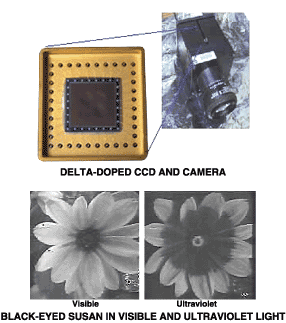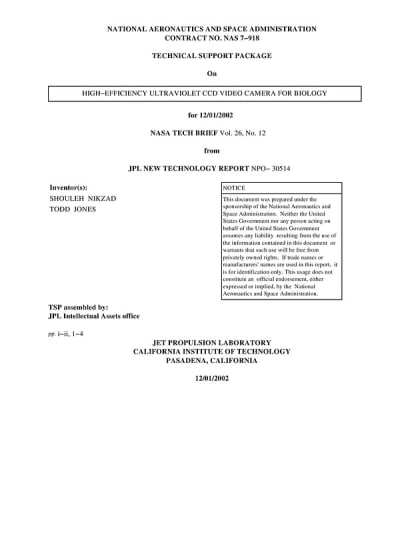A high-efficiency, high-frame-rate ultraviolet (UV) charge-coupled device (CCD) camera that is especially well suited for biological and defense applications was developed. This is the first high-frame rate camera using delta-doped CCDs, which is suitable for biological imaging having high speed, high and stable UV quantum efficiency and insensitivity to visible light.
The camera is built around a back-surface illuminated, thinned, delta-doped CCD with antireflection coating and a visible-light-blocking filter. [Issues pertaining to the principle of operation, design, and fabrication of delta-doped CCDs have been discussed in a number of prior NASA Tech Briefs articles, the one most relevant to the present development being "Back-Illuminated CCDs With Integral Ultraviolet-Pass Filters" (NPO-21007), NASA Tech Briefs, Vol. 25, No. 7 (July 2001), page 20a.] Back-illuminated delta-doped CCDs have been found to operate at quantum efficiency of 40 to 60 percent in the 300- to 400-nm region of interest. With addition of antireflection coatings, quantum efficiency can be increased to between 80 to 100 percent. Moreover, the high quantum efficiency of delta-doped CCDs has been shown to be stable for years.

The camera has been demonstrated to operate at a rate of 2 to 10 frames per second with digital output and digital control of the camera parameters and in acquiring images of biological significance in a wavelength band centered at 300 nm (see figure). At the time of reporting, the camera is operating a delta-doped, 1024-by-1024-pixel, 12-μm-pixel-pitch CCD. Camera electronics are capable of operating at a rate of 30 frames per second and subsequent development is required for design and fabrication of video-rate CCDs for use in this camera. The camera is also compact and transportable and is suitable for field observations as well as laboratory measurements.
This work was done by Shouleh Nikzad and Todd J. Jones of Caltech for NASA's Jet Propulsion Laboratory. For further information, access the Technical Support Package (TSP) free on-line at www.nasatech.com/tsp under the Electronic Components and Systems category.
In accordance with Public Law 96-517, the contractor has elected to retain title to this invention. Inquiries concerning rights for its commercial use should be addressed to
Intellectual Assets Office
JPL
Mail Stop 202-233
4800 Oak Grove Drive
Pasadena, CA 91109
(818) 354-2240
E-mail:
Refer to NPO-30514, volume and number of this NASA Tech Briefs issue, and the page number.
This Brief includes a Technical Support Package (TSP).

High-Effienciency Ultraviolet CCD Video Camera for Biology
(reference NPO-30514) is currently available for download from the TSP library.
Don't have an account?
Overview
The document discusses the development of a high-efficiency ultraviolet (UV) CCD video camera designed for biological applications, created by Shouleh Nikzad and Todd Jones at NASA's Jet Propulsion Laboratory (JPL). The camera aims to address the challenges of tracking fast-moving objects and capturing high-quality images in the UV spectrum, which is crucial for biological research, such as detecting biosignatures in plants.
Current commercial CCDs do not meet the high-speed and stable quantum efficiency (QE) requirements in the UV range. While video-rate CCDs are available, they are not optimized for thinning, which is necessary for achieving high UV QE through backside illumination. Conversely, most back-illuminated CCDs lack the capability for high-speed operation. The proposed solution involves designing a high-speed camera that utilizes delta-doped CCD technology, which has demonstrated a quantum efficiency of 40-60% in the 300-400 nm range. With the addition of antireflection coatings, this efficiency can be increased to between 80-100%. Delta-doped CCDs are noted for their stability over time, making them ideal for long-term biological studies.
The camera features a 1024 x 1024 pixel CCD with 12 μm pixel size and can operate in either frame transfer or full-frame mode. It has been demonstrated to capture images at a rate of 2 to 10 frames per second, with the potential for future development to achieve video-rate capabilities of 30 frames per second. This compact and transportable camera is suitable for both field observations and laboratory measurements.
The document also highlights a practical application of the camera, showcasing its ability to image a black-eyed susan flower in both visible and UV light. The flower's distinct UV patterns assist pollinators like bees and butterflies in recognizing it from a distance, illustrating the camera's potential for biological research.
In summary, this document outlines the innovative design and capabilities of a high-efficiency UV CCD video camera, emphasizing its significance in advancing biological imaging and research. The collaboration between JPL and the inventors aims to enhance our understanding of biological systems through improved imaging technology.

